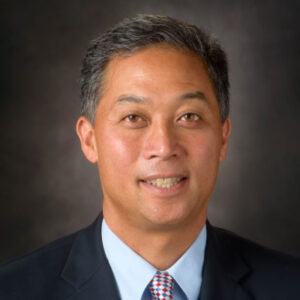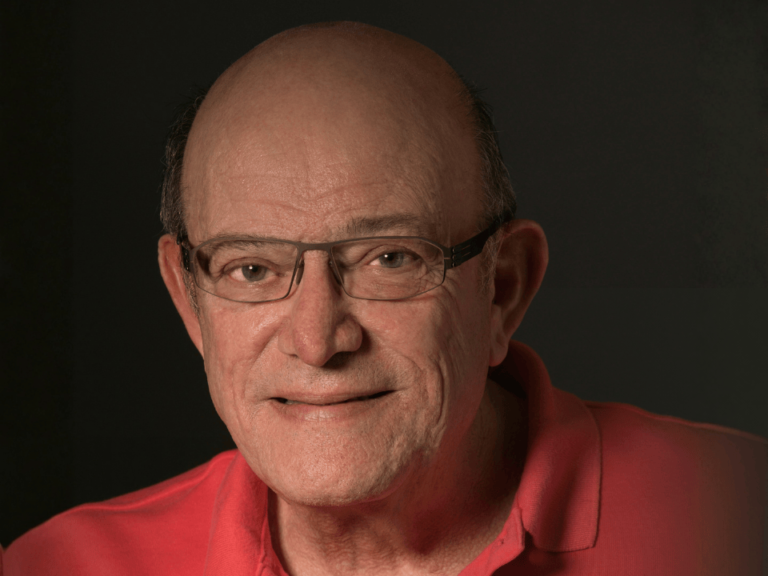

We unexpectedly lost a dear friend and colleague, Dr. Cullen Taniguchi, in mid-November. Dr. Taniguchi was an exceptional and compassionate clinician, brilliant scientist, and nurturing mentor. Above all, he was a dedicated and loving husband, father, son, and brother. We deeply mourn his loss, but we forever cherish the memories and indelible legacy that he leaves with us.
Born and raised in Honolulu, Dr. Taniguchi received his undergraduate degree in chemistry at Occidental College in Los Angeles. Subsequently, he was named as a Rhodes Scholar and later received his medical degree from Harvard Medical School, where he also earned his PhD in cell and developmental biology, studying PI3K isoforms. He completed his residency training in radiation oncology at Stanford University, where he also completed a Henry Kaplan Fellowship in Translational Research.
His mission to end cancer was motivated by the impact of cancer on his own family. He worked tirelessly to advance cancer care, always drawing inspiration from his patients, and motivated to do his best for them. Dr. Taniguchi was loved by his patients for his kind, gentle bedside manner.
Albert C. Koong
In 2014, he joined The University of Texas MD Anderson Cancer Center, where he was a Cancer Prevention and Research Institute of Texas Scholar. As an independent faculty physician scientist at MD Anderson, Dr. Taniguchi was quickly recognized as a rising star and received numerous accolades including the Sabin Family Fellowship, the American Society for Clinical Investigation Young Clinical Investigator Award, the American Society of Clinical Oncology Breakthrough MERIT Award, and the American Association for Cancer Research Early-Career Investigator Award, among others.
Dr. Taniguchi was recently named a 2022 Fellow of the American Association for the Advancement of Science (AAAS) for his work demonstrating the role of HIF-2a in hypoxia-mediated cellular communication within tumors and normal tissues, leading to translational breakthroughs in regenerative medicine and cancer biology.
His mission to end cancer was motivated by the impact of cancer on his own family. He worked tirelessly to advance cancer care, always drawing inspiration from his patients, and motivated to do his best for them. Dr. Taniguchi was loved by his patients for his kind, gentle bedside manner.
He had a remarkable ability to communicate difficult news to patients and their families and helping them to navigate through their care journey.
Upon his untimely passing, one of Dr. Taniguchi’s patients reached out to share an anecdote from the time he spent with her and her husband explaining his translational research and how it might one day impact her care.
The patient shared:
I know I was a patient in that exam room, but for that hour I felt like a colleague and forgot about my tumor a little. I also left with the feeling that there was someone in that whole big place looking out for me.


A leading radiation oncology physician-scientist of his generation, Dr. Taniguchi specialized in gastrointestinal malignancies, with a clinical and research focus on pancreatic cancer. His work played a key role in reducing acute and chronic toxicity from chemoradiation to improve cancer treatment and patient outcomes.
The Taniguchi laboratory was robustly funded by NIH, CPRIT, and many other funding agencies.
Dr. Taniguchi, renowned for his exceptional blend of academic brilliance and warm-hearted humor, profoundly impacted many lives, including mine. His outstanding academic achievements were humorously complemented by his love for mitochondria and hypoxia-themed jokes. I fondly recall his excitement about getting a custom-made mitochondria belt buckle to pair with his boots for scientific meetings.
Taniguchi’s former mentee
His laboratory studied the effect of low oxygen (hypoxia) and the tumor microenvironment on tumor development and cancer associated fibroblasts (CAFs). His investigations into the biology of HIF-1a and HIF-2a signaling led to key mechanistic insights with important therapeutic implications in pancreatic cancer.
He was also an innovator in the development of advanced radiotherapy techniques in the treatment of GI malignancies. He led several early-phase clinical trials as principal investigator.
One of Dr. Taniguchi’s most recent translational findings from one of his clinical trials was published posthumously in Lancet Oncology on Nov. 28. The trial demonstrated how using a synthetic version of a naturally occurring enzyme, superoxide dismutase, could protect normal tissues from radiation damage, thus allowing higher doses of stereotactic body radiotherapy for pancreatic cancers.
This study demonstrated the concept that higher doses of SBRT could be given safely using this approach and laid the groundwork for future studies testing this paradigm.
Prior to his passing, he served as the inaugural director for the Physician Scientist-Translational Science Program in the Division of Radiation Oncology at MD Anderson. He inspired others to follow his example of translating innovative scientific discoveries to clinical implementation. His work will continue to be far-reaching and impactful.
Dr. Taniguchi was deeply committed to mentorship and training new generations of radiation oncologists, researchers and physician-scientists. He mentored more than 50 undergraduate, graduate, and postdoctoral students and residents during his time as clinical faculty at the MD Anderson Cancer Center, and through the UTHealth Graduate School of Biomedical Sciences Cancer Biology program.


Source for all images: MD Anderson Cancer Center
His particular dedication to advocating and supporting students from the University of Puerto Rico to pursue careers as physician-scientists led to his selection as a PI for the U54 Partnership for Excellence in Cancer Research between MD Anderson and UPR, where he continued to mentor students at each step of the physician-scientist career pathway.
He was passionate about helping students and trainees to find and reach their highest potential, and many trainees were awarded highly competitive grants, doctoral and postdoctoral fellowships, and selective faculty positions under his tutelage. His lab members and mentees were his second family.
One of his former mentees sums up Dr. Taniguchi’s caring, joyful, and service-oriented spirit:
Dr. Taniguchi, renowned for his exceptional blend of academic brilliance and warm-hearted humor, profoundly impacted many lives, including mine. His outstanding academic achievements were humorously complemented by his love for mitochondria and hypoxia-themed jokes. I fondly recall his excitement about getting a custom-made mitochondria belt buckle to pair with his boots for scientific meetings.
True to his word, a few months later, he proudly shows up at a meeting wearing it with pride! This was just one of the many ways he effortlessly shared his passion for science, especially with his mentees. His distinctive interests, love for laughter, and belief in the goodness of people deeply influenced all of us around him.
While his passing has left a vast void, his enduring spirit of kindness and inquisitiveness continues to inspire and guide us.
Beyond his clinical and academic excellence, Dr. Taniguchi was a devoted family man. Even with all of his professional responsibilities, he prioritized his family first by driving his children to school, taking them to activities, and coaching their softball team. His pride for them was evident as he spoke about their piano and other skills.
He also had an extraordinary talent to gather people together over a meal or a game of softball to further strengthen the ties of colleagues and friends. His favorite party trick was his ability to rip a phone book in half with his bare hands. I am fairly certain that he was the only Rhodes Scholar in the world who could rip a phone book in half with his bare hands!
He was endearing to those around him with his wit, humor, and caring nature. Dr. Taniguchi simply possessed a captivating presence and lived life to the fullest. We take solace in knowing that his bright light will shine on through his family, his colleagues, and his work. He will be dearly missed.
Albert C. Koong, MD, PhD
Division head and chair,
Radiation Oncology,
MD Anderson Cancer Center








